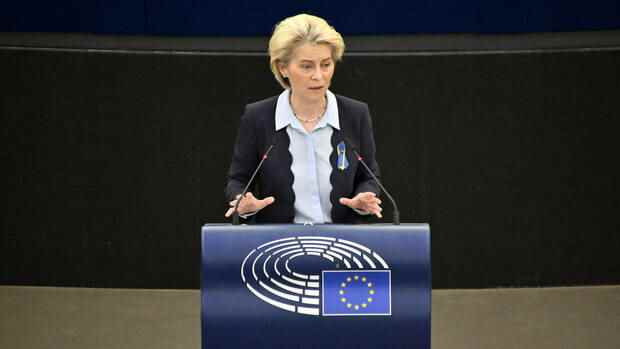The EU Commission President is to justify an order worth billions to the British BT.
(Photo: IMAGO/Future Image)
Brussels The planned award of an EU contract worth billions to a subsidiary of British Telecom (BT) triggers outrage in Brussels. The company BT Global Services Belgium is to operate the central IT network of the EU administration in the future. The eight-year contract from 2024 is worth 1.2 billion euros.
The BT subsidiary recently won the EU Commission’s tender – to the surprise of the defeated rivals from the EU. It is about the IT network TESTA, short for “Trans-European Telematic Services between administrations”. This connects more than 700 authorities in the EU and is intended to ensure the confidential exchange of data.
Since the news site “Politico” unveiled the BT order a few weeks ago, the pressure on the EU Commission has been increasing. After all, Great Britain is a third country and the British secret services have a reputation for being lax about data protection. They had shared European data with their partners in the Five Eyes Alliance, thereby violating the right to privacy, as the European Court of Human Rights ruled in 2018.
The decision should be “revised immediately,” says CSU MEP Markus Ferber. “TESTA is the digital nerve center of the European Union. If we leave the operation of this sensitive infrastructure to a company from a third country, we open the floodgates to espionage.”
Top jobs of the day
Find the best jobs now and
be notified by email.
The MP also wrote a letter of protest to EU Commission President Ursula von der Leyen. It states that the British secret services have far-reaching powers and are “notoriously not squeamish”. The assignment to the BT subsidiary opens up the possibility “of a foreign secret service reading confidential EU information”. Ferber also raises the question of whether the new technology is reliable. A change of operator in the middle of the Ukraine war could be problematic, he writes.
Allocation process is currently stopped
The previous TESTA operator is T-Systems International, a subsidiary of Deutsche Telekom. The company was not shortlisted in the tender and has now filed an annulment action against the Commission before the European Court of Justice (ECJ). That means she wants to force a new tender. Details of the lawsuit have not yet been released. Deutsche Telekom does not comment on this when asked.
The award process has been stopped for the time being by an injunction by the ECJ. The EU Commission had informed all applicants of their decision, but the contract with BT has not yet been signed. The Commission is keeping a low profile on the whole process. “We do not comment on ongoing proceedings,” says a spokesman. “We have to wait for the decision of the court.”
From a purely formal point of view, British companies can apply for government contracts in the EU. Both sides decided that in the post-Brexit trade agreement. The EU Commission also decided last year that personal data from EU citizens may continue to be managed on British servers for the time being because the data protection is equivalent.
Politically, however, any dependency on London after Brexit is explosive. Von der Leyen cannot constantly invoke “the mantra of the strategic autonomy of the European Union” and then place sensitive infrastructure in the hands of a third-country provider, says Ferber. Such negligence could cost the EU dearly in the long run.
More: Von der Leyen offers India technology partnership
